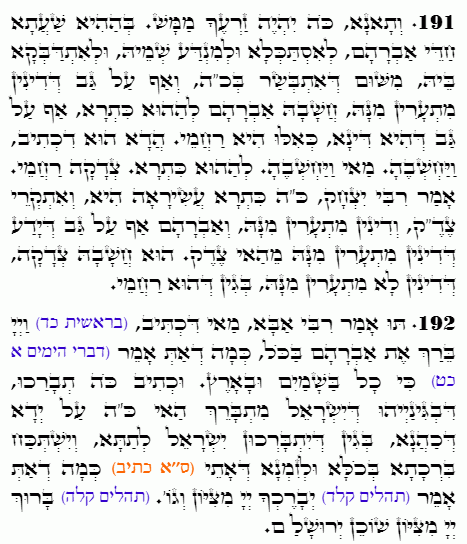Daily Zohar # 4587 – Naso – He was blessed with everything
Daily Zohar 4587

Hebrew translation:
192. עוֹד אָמַר רַבִּי אַבָּא, מַה שֶּׁכָּתוּב (שם כד) וַה’ בֵּרַךְ אֶת אַבְרָהָם בַּכֹּל, כְּמוֹ שֶׁנֶּאֱמַר (דברי הימים-א כט) כִּי כֹל בַּשָּׁמַיִם וּבָאָרֶץ. וְכָתוּב כֹּה תְבָרֲכוּ. שֶׁבִּגְלַל יִשְׂרָאֵל מִתְבָּרֶכֶת הַכֹּ”ה עַל יְדֵי הַכֹּהֵן, בִּשְׁבִיל שֶׁיִּתְבָּרְכוּ יִשְׂרָאֵל לְמַטָּה, וְתִמָּצֵא בְרָכָה בַּכֹּל. וְלֶעָתִיד לָבֹא (כָּתוּב) כְּמוֹ שֶׁנֶּאֱמַר, (תהלים קלד) יְבָרֶכְךָ ה’ מִצִּיּוֹן וְגוֹ’. (שם קלה) בָּרוּךְ ה’ מִצִּיּוֹן שֹׁכֵן יְרוּשָׁלִָם.
.
Zohar Naso
Continued from previous DZ
#191
We have learned that “Thus shall your descendants be” (כֹּה יִהְיֶה זַרְעֶךָ) means literally. His seed will indeed come from Malchut; without the sefirah of Malchut, he would not have offspring. This transformed Malchut into mercy for him. At that moment, Abraham rejoiced to look and know His name and to cleave to Him because he was assured through “thus” (כה). Even though judgments are aroused from her, Abraham considered that sefirah, though it is judgment, as if it were mercy. For without her, he would not have children. This is what is meant by, “and he counted it to him” (ויחשבה) in the feminine form. What does “and he counted it” mean? It means that he considered the sefirah, Malchut, as mercy, for “justice” (צדק) is judgment, and “righteousness” (צדקה) is mercy.
Rabbi Yitzchak said, “כה (Thus) is the last sefirah, which is Malchut. It is called צדק (justice), and judgments are aroused from her. Even though Abraham knew that judgments are aroused from this צדק, he considered it צדקה (righteousness), from which no judgments are aroused, because it is mercy.”
#192
Rabbi Aba also said: Regarding what is written,” וַה’ בֵּרַךְ אֶת אַבְרָהָם בַּכֹּל” “And YHVH blessed Abraham with everything” (Genesis 24:1), it is as you say, for “כִּי כֹל בַּשָּׁמַיִם וּבָאָרֶץ” “for everything (כֹל) in heaven and on earth” (1 Chronicles 29:11). This means that He blessed Abraham with the sefirah of Yessod, which is called “everything” (כל), as it nourishes and blesses Malchut. Yessod receives from heaven Zeir Anpin and bestows upon the earth, which is Malchut.
And it is written, “כֹּה תְבָרֲכוּ” “Thus you shall bless” (Numbers 6:23), meaning that the priests shall bless the Malchut, which is called “thus” (כה). Because of Israel, this “thus” (כה) is blessed by the priest so that Israel below will be blessed, and the blessing will be found in “everything” (כל). In the future, it is written,” יְבָרֶכְךָ ה’ מִצִּיּוֹן” “May bless you from Zion” (Psalms 128:5), “Blessed be the Lord from Zion, who dwells in Jerusalem” (Psalms 135:21). This means that Malchut will no longer need to be blessed first; rather, the blessing will always be present within her. Zion represents the inner aspect of Malchut, and Jerusalem signifies the outer aspect of Malchut.
Lesson;
Abraham’s understanding and perception transformed Malchut, typically associated with judgment (דין), into a source of mercy (רחמים), essential for his lineage.
The use of the feminine form “ויחשבה” indicates that Abraham viewed the sefirah of Malchut (a feminine aspect) as mercy despite its association with judgment.
The terms “justice” (צדק) and “righteousness” (צדקה) reflect the dual aspects of judgment and mercy within Malchut. Abraham’s faith and understanding made him perceive Malchut as a source of mercy, ensuring his descendants.
Rabbi Yitzchak’s teaching reinforces the idea that even aspects of judgment can be perceived and transformed into mercy through profound faith and understanding. This transformation is crucial for the fulfillment of Hashem’s promises, illustrating the dynamic relationship between spiritual attributes and human perception on the level of Malchut.
{||}

 Previous: Naso
Previous: Naso

